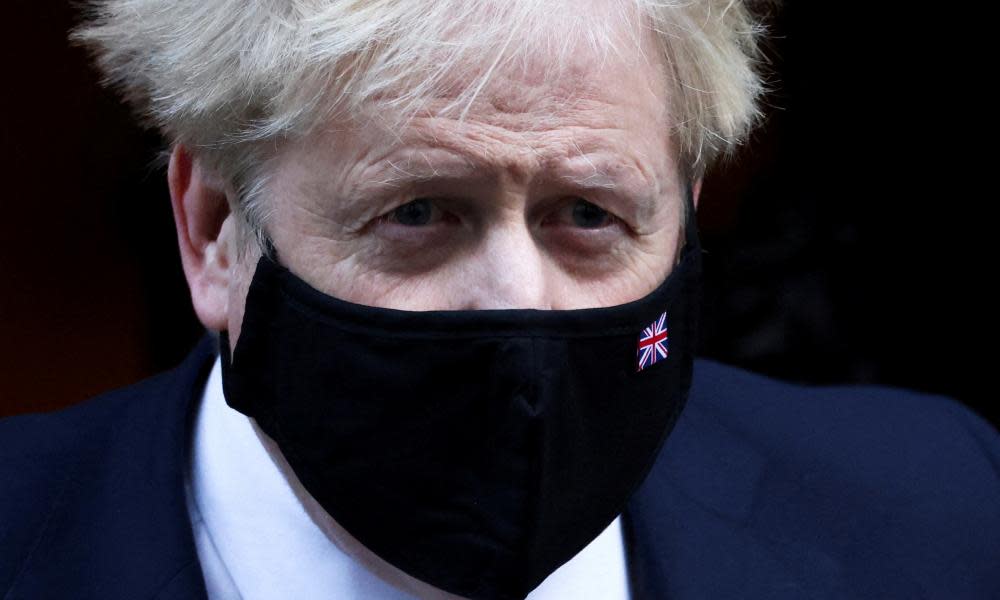Boris Johnson prepares a populist offensive to save his skin

Boris Johnson’s plan for salvaging his premiership has become increasingly clear: acknowledge a “culture” of drinking in Downing Street – but not that it stemmed from the top – and then change the subject, by announcing a slew of populist policies.
Nadine Dorries’ announcement that the BBC licence fee will be frozen, then abolished, had been in the works for a while; but the timing was highly convenient, giving Tory right-wingers something to cheer as Johnson’s future hangs in the balance.
Other plans expected in the coming days, according to the Sunday Times, include sending in the military to help tackle cross-Channel migration; training schemes for universal credit claimants – whose benefit was recently cut by £20 a week – and the much-delayed “levelling up” white paper.
The lifting of Covid restrictions on 26 January, if the Omicron wave continues to abate, would also give Johnson a platform to deploy his customary boosterism.
Related: Tories will oust Boris Johnson if he tries to dodge ‘partygate’ blame
The hope appears to be to convince the public – and Johnson’s own mutinous backbenchers – that he is ready to draw a line under all the scandal, and get on with government.
What is unclear is whether Tory MPs are willing to give him the chance. Having spent the weekend hearing from constituents and grassroots members, they are unlikely to return to Westminster on Monday in a more forgiving mood.
Former minister Tim Loughton became the latest MP to call for Johnson to resign this weekend, saying the prime minister had resorted to “obfuscation, prevarication and evasion” over partygate.
He is one of six MPs who have publicly said they are unwilling to wait for Sue Gray’s investigation to be published and want Johnson to go, but many more are hanging their decision about his future on her findings.
Gray is expected to censure senior officials for their role – including, presumably, Martin “bring your own booze” Reynolds. But where Johnson’s actions are concerned, she is expected to stick to setting out the facts as she understands them.
It may be impossible for her to judge whether he really “believed implicitly” the 20 May garden party was a “work event”, for example – leaving the ultimate judgment about his culpability up to politicians to make.
And the emergence of more gatherings for her to investigate is likely to delay the report beyond this week, extending a period ministers were already calling “purgatory”.
The outlines of the prime minister’s likely response to Gray’s findings, however, were already evident from Conservative party chair Oliver Dowden’s broadcast round on Sunday morning.
He said Johnson felt a “sincere sense of regret” over what had happened – and suggested the prime minister was now the man to clean up “the underlying culture” in No 10.
Johnson’s colleagues will have to decide whether the public will think that a remotely plausible idea – or whether he is irrevocably tainted in voters’ minds by the drip, drip of stories about lockdown-busting social events.
They won’t have been reassured by the latest Opinium poll for the Observer, which showed his popularity ratings lower than Theresa May’s.
Tory MPs also fear that more revelations are to come as they steel themselves to hit the campaign trail for May’s local elections. In particular, new facts could yet emerge that destroy Johnson’s claim to have attended just a single party – and that accidentally.
Meanwhile, the problem with his plans for a flurry of rightwing announcements to tempt true-blue backbenchers is that his main rivals, Liz Truss and Rishi Sunak, are if anything more rightwing – but unburdened by the taint of scandal.
And the backdrop for a new year relaunch is hardly auspicious, with a national insurance rise coming in April to coincide with rocketing energy bills for consumers.
Johnson is a great political survivor, and some Conservative veterans were insisting this weekend he could still be in Downing Street by the autumn; but his escape route from the deep predicament he finds himself in now looks very narrow indeed.

 Yahoo News
Yahoo News 
